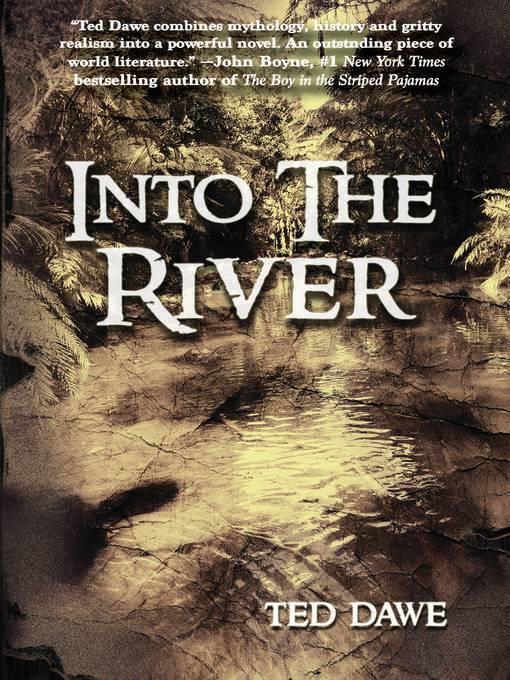
Into the River
Devon Santos
کتاب های مرتبط
- اطلاعات
- نقد و بررسی
- دیدگاه کاربران
نقد و بررسی

March 14, 2016
In a book briefly banned in the author’s native New Zealand, Dawe revisits a character from his novel Thunder Road, this time as an adolescent. Te Arepa is a 13-year-old from Whareiti, a Maori village. Te Arepa sees himself in his adventuring ancestor, Diego Santos, whose legend permeates the village. After being accepted to Barwell’s Collegiate, a posh boarding school in Auckland, Te Arepa becomes Devon, disguising his name and Maori heritage to escape torment by senior boys. With friends Mitch and Steph, Devon experiences a world ripe with possibilities and the pressures of academic excellence. But his relationship with Steph brings its own set of problems in the form of stealing, drugs, and sex, including exploitation at the hands of a teacher. Dawe explores the inner sanctum of boarding schools and bullies in the morally confused Devon, who gravitates to choices that derail his life. While the descriptive scenes feel prolonged and the female characters are one-dimensional, Dawe’s novel cleverly leaves the ending unresolved, emphasizing the complications of culture, loyalty, and consequences when “there is freedom and then there is everything else.” Ages 13–up.

April 1, 2016
A Maori teen's brutal experiences at boarding school provide an object lesson in how systems of power perpetuate themselves. Te Arepa Santos is a rural boy, keen on hunting eels in a nearby river and fascinated by his grandfather Ra's tales of how their intrepid ancestor Diego Santos assimilated into their tribe and saved them from annihilation by a rival tribe. When he wins a merit scholarship to prestigious Barwell's Collegiate in Auckland, Te Arepa discovers that he is the only Maori student enrolled. He faces class snobbery and racism from every quarter and finds himself trying to erase his ethnic identity in his attempts to adjust to Barwell's unyieldingly patrician, casually violent culture. Taking the nickname Devon, in tribute to the ship that brought Diego to New Zealand from Spain, is the first of many self-effacing tactical decisions he makes that eventually cost him dearly. Every relationship is transactional and every experience, a competition for a better position in the school's hierarchy. This award-winning book has also been the object of censorship attempts in New Zealand due to its frank, often grim representations of violence, drug use, and fumbling teen sex. Though the prose is often plodding and the plotting littered with heavy exposition, Te Arepa/Devon is a deeply compelling character. The frequent Maori references are defined in footnotes. Readers will either see themselves in Devon and his story or will reconsider their own roles in their schools' social structures. (Fiction. 14-18)
COPYRIGHT(2016) Kirkus Reviews, ALL RIGHTS RESERVED.

May 1, 2016
Gr 8 Up-Te Arepa Santos is a 13-year-old Maori boy living in a remote rural town in New Zealand. Life is slow but rich with family and friends. He can easily spend a day catching eels with his friends, or nights with his grandfather telling stories of the ancestors he is named after. When the teen wins a scholarship to a prestigious Auckland boarding school, he goes with expectations from his family. The school resembles an English private school-Te Arepa is expected to study Latin and to put up with bullying by senior pupils, which is traditional within the setting. His Maori language and culture are not valued. As all the boys are given nicknames, Te Arepa becomes Devon, changing not only in name but in nature as he struggles to fit in. Devon's best friend is Steph, who has his own identity issues. Familiar with boarding schools, Steph manipulates teachers and other students to get what he wants. This work has won multiple awards in New Zealand and has been at the center of much controversy there. Aimed at older teens, the novel contains very strong language, underage sex, sexual relations between a student and a teacher, drug use, and violence. However, these elements are not gratuitous but are integral to the narrative, which the author based on his experiences as an educator in this kind of setting. While the story is firmly rooted in New Zealand, the themes are universal to all teens.
Copyright 2016 School Library Journal, LLC Used with permission.

May 1, 2016
Grades 10-1 Te Arepa grew up in a small New Zealand village, enraptured by tales of his Maori ancestors. When he gets a scholarship to attend tony Barwell's, a prestigious all-boys boarding school, he is looking forward to the academic glory, but the hurdles, especially racism, are significant. He is ultimately a success, but he begins to feel burdened by his Maori identity and bored by village life. By the novel's end, Te Arepa seems almost indistinguishable from his white peers, and though there's a hint he has become disenchanted by Barwell's, his future is unclear. Though it's unfortunate that most of the girls in Dawe's novel are fairly one-dimensional, Te Arepa, who cycles through a believable variety of identities and struggles, is beautifully vivid. The compassionate depiction of the teen's choices, both good and bad, as well as the candid portrayal of life at an all-boys school, packed as it is with drugs, drinking, sex, and violent bullying, will give this significant appeal for fans of character-driven novels where the conclusions aren't very rosy, let alone clearly definitive.(Reprinted with permission of Booklist, copyright 2016, American Library Association.)

























دیدگاه کاربران